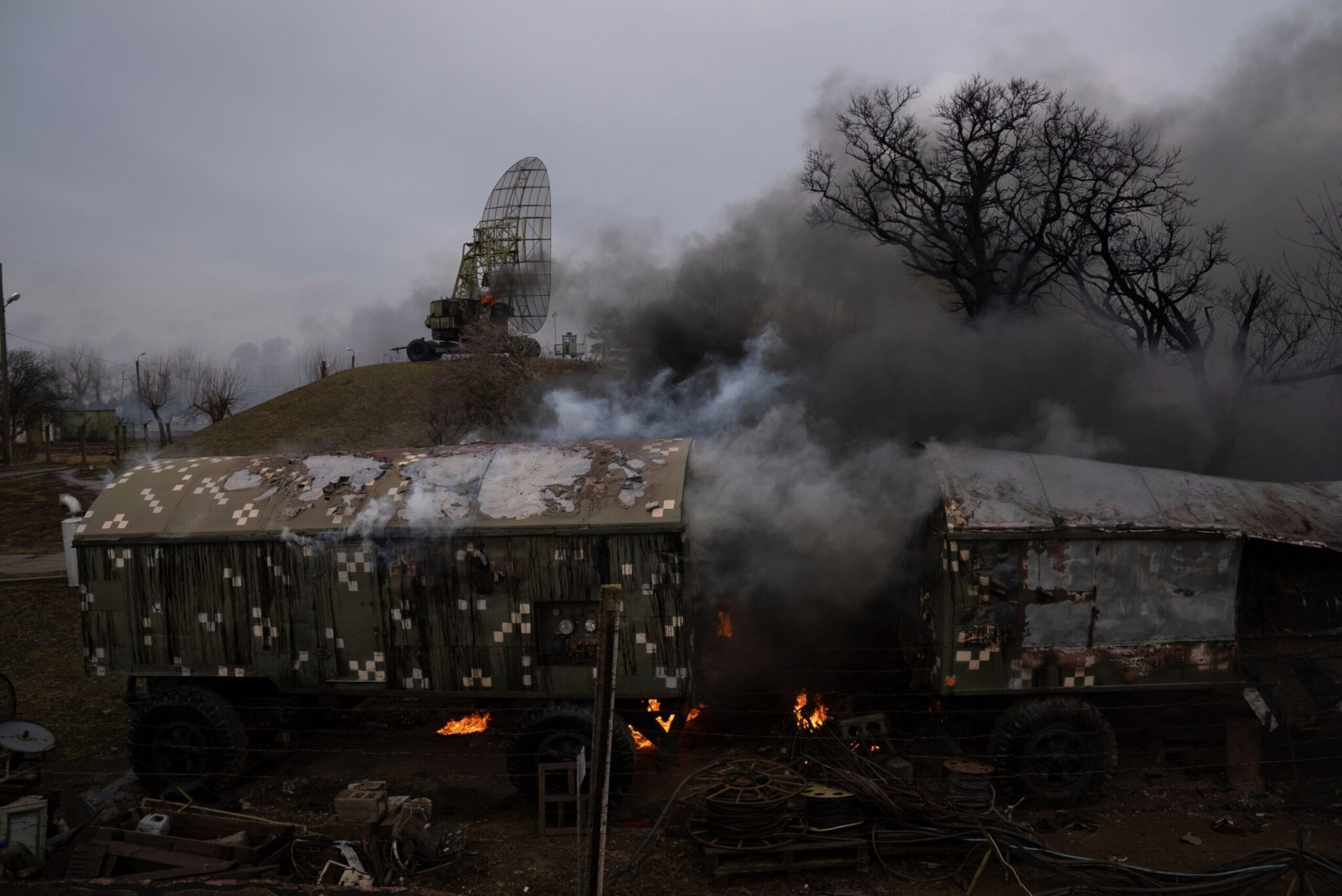
Ukrainian military facility neutralized by the Russian army. Photo: Twitter / @ajplus.

Orinoco Tribune – News and opinion pieces about Venezuela and beyond
From Venezuela and made by Venezuelan Chavistas

Ukrainian military facility neutralized by the Russian army. Photo: Twitter / @ajplus.
Caracas, February 24, 2022 (OrinocoTribune.com)—Today Russian media reported that Russian President Vladimir Putin said Russia was forced to launch the military operation on Ukrainian territory and its main objective is the demilitarization and denazification of that country, after more than eight years of militarization and regular bombardment of Lugansk and Donetsk has left a death toll of more than 14,000 civilians.
On February 21, Russia recognized the independence of Donetsk and Lugansk. The two territories with majority Russian-speaking populations declared their independence from Ukraine in May 2014 after several fascist incidents organized by Ukrainian extremists resulted in the killing of dozens of innocent Russians. The republics then disregarded the new Ukrainian authorities that had come into power in the February 2014 coup in Kiev. Since then, the conflict between the central government and the two territories has not ceased.
During a televised address on the morning of February 24, Putin announced the launch of “a special military operation” on Ukrainian territory, faced wiith what Russia described as aggression by Kiev.
Putin stated that one of Russia’s goals is to achieve “the demilitarization and denazification of Ukraine.” He also threatened to put the perpetrators of “numerous bloody crimes against civilians” on trial. The Russian president asked those in uniform, and civilians in Ukraine, not to resist this operation, and explained that this is not an operation against civilians, and warning that Russia will immediately respond to any external force that threatens it or gets in its way.
RELATED CONTENT: 5 Commodities to be Affected by Donbass Conflict
For its part, the Russian Ministry of Defense said the military attacks are not directed against Ukrainian cities, and will not endanger the civilian population, but rather seek to disable Ukraine’s military offensive infrastructure. The Russian Defense Ministry also reported on media warfare operations launched in Ukraine that claim civilians have been affected by the Russian military actions. The ministry denied any such instances, and reiterated that Russia’s only targets are Ukrainian offensive capabilities.
74 Military Facilities Destroyed
Russia claims to have destroyed, during the first hours of the operation, 74 ground facilities of Ukraine’s military infrastructure, including 11 airfields. “The Armed Forces disabled 74 ground targets of Ukraine’s military infrastructure,” Russian Defense Ministry spokesman Igor Konashenkov reported at a press conference.
The spokesman added that Russian troops had also disabled three command posts, an operation post of the Ukrainian Navy, 18 radar stations of the S-300 and Buk-M1 air defense systems in possession of the Ukrainian army, and shot down an attack helicopter and four Ukrainian Army drones of the Bayraktar TB 2 model.
The Russian Defense Ministry also specified that they use high-precision weapons to disable “military infrastructure, anti-aircraft defense objects, military airfields and the aviation fleet of the Armed Forces of Ukraine.” The Ministry said Russian Armed Forces did not carry out any attacks against Ukrainian cities.
The Russian army established control over an airfield near the Ukrainian capital Kiev, and reports of Ukrainians leaving their posts, and not offering resistance, were shared on social media platforms. The capital, Kiev, was under a tense calm with occasional explosions reported by local residents.
RELATED CONTENT: Venezuela Gives Full Support to Putin & Criticizes US and NATO Militarism
Additionally, Russian authorities informed the media that they took control of the Chernobyl zone, where the infamous nuclear plant is located, to avoid any provocations, due to its sensitive environmental potential, and due to the risk of it being used for propaganda and false flag operations by Ukrainian forces.
Belarus’ Lukashenko attempted to stop the conflict
The President of Belarus, Aleksandr Lukashenko, revealed today that during the night of February 23, he asked his Minister of Defense to communicate with his Ukrainian counterpart, Oleksiy Reznikov, to advise him to contact the Russian Minister Sergei Shoigú, with the purpose of preventing the military operation in Donbass. The advice, however, was ignored by Ukraine.
“Did he call there (Russia)?” asked Lukashenko. “He did not do it! Knowing that a conflict could break out, he did not even call Moscow.” The Belarusian head of state added: “Look, there are cases in history, when Khrushchev called Kennedy in the middle of the night and they stopped a thermonuclear war. And here, as you can see, it was too difficult to make a call, pick up the phone. You bastard!”
Featured image: Ukrainian military facility neutralized by the Russian army. Photo: Twitter/@ajplus.
Special for Orinoco Tribune by Jesús Rodríguez Espinoza
OT/JRE/SL/EF

Jesús Rodríguez-Espinoza is an expert in international relations, Venezuelan politics, and communication. He served for several years as Consul General of Venezuela in Chicago (United States); before that, he was part of the foundational editorial team of Aporrea.org. He is the founder and editor of the Venezuelan anti-imperialist news outlet Orinoco Tribune.